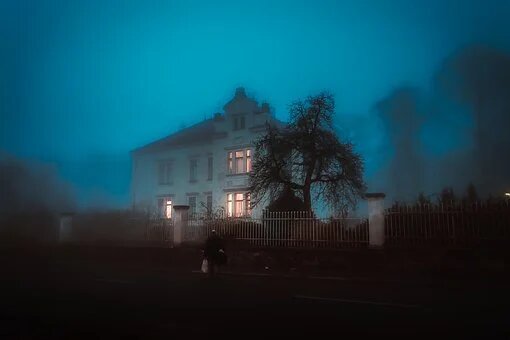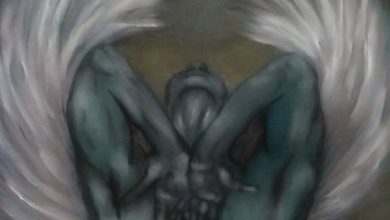
The Lady’s Maid’s Bell by Edith Wharton is a short story written in first-person narrative, focusing on the perspective of Alice Hartley, a woman who has just recovered from tuberculosis and starts working for a mistress at an isolated mansion, tucked into the countryside. There is an air of mystery throughout the story. The “gloomy’ aura of the house which creates a strange feeling within Hartley translates itself into a suspenseful tone. There are switches between brief dialogue interactions, Hartley’s inner thoughts, and her observations. Wharton employs imagery, symbolism, metaphors and foreshadowing in this story. What is the most interesting part of this is that there is no clear-cut answer, nor is there an ending with a direct conclusion. Subtle hints have been dropped throughout the piece, and one may piece them together to form their own conclusive interpretation. Yet at the same time, due to the precision and emotion expressed by Wharton, most conclusions stem from the same thoughts. The main themes are paranormal activity, unhappy marriage, secrecy, selfishness, loyalty, loneliness and isolation.
The Lady’s Maid’s Bell | Summary
The story begins with the main character, Alice Hartley, being sent to a distant house in the countryside to work as a Maid’s to the mistress, Mrs Brympton, who is falling ill regularly. Hartley has just recovered from tuberculosis and is hence very thin and frail. She needs to begin work again, and Mrs Railton believes this is the perfect opportunity. She says that the mistress is warm and kind, and as for Mr Brympton- he is never at home, and when he does visit, it is better to stay out of his way.
Hartley arrives at the house in the afternoon, and it looks rather gloomy. Nonetheless, the mistress and the other staff seem friendly enough, and Hartley is led to what will be her room. At the end of a passage, Hartley sees a pale woman, but the next moment, she is gone. Hartley assumes she must be a nurse. She asks the mistress whether she will ring the bell to call her, to which Mrs Brympton seems flustered and tells her that she will call through Agnes. Hartley finds it strange that a mistress should use a medium to call her own Maid’s, but does not ask further. Later, when Hartley asks Agnes about a pale woman, she is not aware of her, so Hartley figures she must be a friend of the cook.
Weeks go by, and Hartley enjoys the mistress’s company. She learns new things, like the neighbour, Mr Ranford, is a good friend of the Brymptons, who keeps Mrs Brympton company when her husband is away. She also learns that Mr Brympton is a hostile man who does not care much for his wife and prefers to travel the world with friends. She meets him when he comes home a week after she begins working there- the household is tense and everybody is on edge as they prepare for his arrival. He is loud and brash, clearly not well-matched for the quiet Mrs Brympton. He does not spare Hartley a second glance, either, owing to her sorrowful appearance caused by her illness. Further, every time Hartley asks about Emma, the old Maid’s who had been the mistress’s best friend and had passed away, the members of the house become awkward. Though they do not hesitate to talk about her, they close up after too many questions are asked.
Hartley feels gloomy inside the house- there is nothing particularly wrong with it, but she feels a strange aura emanating from it. Mrs Brympton seems to notice that and tries to send Hartley out for as many errands as she can so that she can get fresh air. One day, when she was out in the town, Hartley bumps into an old friend, who tells her that the Brymptons have had four maids in the past 6 months. She says it is impossible to stay there long-term, though the mistress is kind. This makes Hartley think, once again, that it is something about the house. The next time Mr Brympton is home, the couple fight often, quietly in their rooms. Other times, he does not pay attention to his wife at all. One of those nights, Hartley hears the bell.
The sound shocks her awake. She is not used to the sound, for the mistress never uses it. But what shocks her more is she sees the pale woman from the first-day dash ahead of her through the passage. Hartley realises with a jolt that it is Emma, the dead Maid’s. She pauses and then tells herself she needs to go through the passage, because it is her job to attend to the mistress. Yet when she does, Mr Brympton scolds her angrily for interrupting his sleep, and the mistress tells her that she was dreaming. A second time, she tells Hartley she must have imagined it.
The next few days, Mrs Brympton appears a bit shaken up. She asks Hartley to run two errands quickly one morning before Mr Brympton wakes up. One is to buy medicine- Hartley wonders if it may be with dangerous intent, but to her relief, it is only lime water. The second is to deliver a note to Mr Ranford. She returns home quickly and bumps into Mr Brympton. He asks her whether she thought he was drunk last night, and she replies no truthfully. Later that day, as Hartley was sewing, the machine broke. She looked through the draws of the old sewing room for spare materials when an old photo floated down- a woman whom Hartley recognized as the pale woman in the passage. When she asks Mrs Brympton, she confirms that it is Emma. But on further discussion, she gets up and walks away. Throughout that month, Mr Brympton is at home, while Mr Ranford does not visit.
About a month later, Mr Brympton finally leaves for a cruise to the West Indies. The house breathes a sigh of relief, but Hartley notices that neither Mrs Brympton nor she herself is the same as before, and Mr Ranford does not visit nearly so often. One day, Hartley hears footsteps and assumes it to be Agnes- but when she looks up, she sees the pale figure of Emma. Hartley oddly does not feel afraid- instead, she feels like Emma is trying to tell her something. Emma cannot say a word but leads Hartley to Mr Ranford’s house. Before she can ask anything or understand what Emma is trying to tell her, Mr Ranford opens the door and Emma disappears. In the cold snow, Hartley then faints and is taken inside by Mr Ranford.
The next and final time the bell rings, Emma is standing at the stairs near the mistress’s room as Hartley rushes inside. The mistress falls faint on the floor, and Mr Brympton comes in to check the source of the chaos. He does not seem to care at all that his wife is passed out on the floor. The husband pulls open the door, and finally, he too sees the ghost of Emma. It shocks him, and he cannot move. Mrs Brympton regains consciousness for a final moment, focuses her gaze on her husband, and passes away. The funeral is a quiet, small affair in the loneliness of the countryside. Mr Ranford attends, though he does not stay till the end, and Mr Brympton’s gaze is trained on him the entire time. Once the service is over, Mr Brympton departs for his trip with his friends without saying a word.
The Lady’s Maid’s Bell | Analysis
From the beginning of the story, when Hartley is explained her new residence and house of work, Wharton lays a foundation of the Brympton couple’s characteristics- specifically mentioning that it is best to “stay out of” Mr Brympton’s way. This prepares us for the hostility of his personality. Further, the description of the location of the mansion, far off in the countryside, is a foreshadowing of its symbolism. Most importantly, the first time Hartley sees the ghost of Emma, she is not even aware that it is a ghost- she looks like a real person, and Hartley assumes she is one of the staff. However, by introducing her in the beginning and creating a slight confusion around her, the readers are aware that there is more to this pale-looking woman. Hence, we may say the first couple of pages of the story are meant to induce curiosity and anticipation of the readers, as well as set the location and context for the plot. We also see instances of the Maid’ss being slightly hesitant or puzzled in terms of the room allotment, which is another aspect that seems a little out of place, leading it to stick in the readers’ minds.
We are also introduced to Mr Ranford, a close acquaintance of the Brymptons- both of them- and someone who spends time with the mistress and keeps her company when her husband is away. It seems rather unsuspicious and normal at first- even Hartley observes that it is good that the mistress has such company. Hartley is told that when she is needed by the mistress, she should not ring the bell- instead, Agnes would fetch her. Hartley is surprised that there is a middle-person between them despite the abundance of bells in the house. This is in relation to the title, and also immediately forms a sense of anticipation in the readers, a piece of information that the eye catches sharply. It’s the beginning of the theme of secrecy- secrecy is an overarching theme. There is no one specific place where it is implied or introduced, but rather seems to be present in every part of the text.
When Mr Brympton is in the house, we see that the mood changes drastically. It is here that we are truly introduced to the theme of an unhappy marriage- though it was hinted at before. They argue often, and Mr Brympton does not pay attention to his wife at all- he would rather travel the world with his friends. From that and the way he called on Hartley and observed her briefly, before turning away at her unappealing appearance, we may gather his selfish nature. He seems to think only of himself and his own enjoyment. Rather than a husband, his position in the household resembles a fussy guest at a hotel. Hartley notes that they don’t match- he is loud and brash, while she is timid and soft-spoken. He would appreciate a more physical relationship, while she would like to keep to herself. This fuels their arguments and it’s possible that the unappealing situation at home is what motivates Mr Brympton to leave so often. Here, it is important to note that Mrs Brympton clearly has a better relationship with Mr Ranford compared to her own husband.
With the introduction of Emma Saxon’s name, it is clear that she is a key character in the story. Interestingly, though everybody in the household is okay with saying that she had died, nobody is willing to continue the conversation for questions beyond that. It makes one question the reason or way for Emma’s death- did she die in a natural way? Why is everyone so flustered when it is brought up? Why do they avoid speaking further? This is another element of secrecy found in the story- it is as though everyone in the house knows something Hartley doesn’t, and no matter how warmly they welcome her, they will not bring her into the secret. We also wonder whether this ghost of Emma has ever been seen by Mrs Brympton, as they were very close in real life. It is possible that the ghost of Emma is the one that rings the bell for a specific reason, which is why Hartley is instructed not to – Mrs Brympton may not want to be confused between the two. However, this is never confirmed: it is merely speculation.
Hartley continuously notices something gloomy about the house- though there is nothing wrong with it and the people are nice, she cannot feel a strange dreadful feeling from it. This links to both secrecy and paranormal activity. The paranormal, in this case, is the ghost of Emma which lingers around- unbeknownst to the narrator at the time. The other could be the air of hidden information circling it. It could also be the atmosphere Mr Brympton brings back every time he arrives. But Hartley feels happy to get away from it even for some time when the mistress gives her errands in the town. From this, we can see just how isolated the mansion is. With her regular illnesses, Mrs Brympton does not leave the home. Hence the mansion is completely cut off from the rest of civilization or people- it is almost in the middle of nowhere, in the countryside. The isolation of the mansion directly symbolises Mrs Brympton’s loneliness- she is cut off from normal life.
This loneliness leads us to her friendship with the neighbour, Mr Ranford, who seems to be trusted by both Brymptons. However, this slowly comes into question. From Hartley’s observations, as well as the letter delivered to him in secret, there is a doubt about their relationship. This questions Mrs Brympton’s loyalty, but the situation is slightly ambiguous, and especially confusing because she is also being mistreated and neglected by her husband who is not only absent but doesn’t care about her, either. Another time that sparks doubt is the way Mr Ranford appears often when Mr Brympton is in town, as opposed to when he’s gone. This questions loyalty, which is a theme. However, loyalty does not only have to refer to a marriage. It can also show in other relationships, such as Emma and Mrs Brympton. Even in her ghostly form, it seems like it was in unrest. Spirits often cannot move on before completing their necessary tasks on Earth. One of them may have been securing a better future for the mistress.
We do not know whether Emma was telling Hartley that Mr Ranford was perfect for the mistress, or that there is something to be investigated. But in the end, when the bell rings a second time and Hartley rushes to the mistress’s room to answer, he is standing outside the door. The husband not caring at all whether his wife was alright or not was the final straw- Emma decided to show her face to the husband, and he duly received a shock. We also wonder why the mistress’s final person to see before dying was Mr Brympton. They never got on- the Maid’ss did the work and Mr Ranford spent more time with her. So why was he the last person she wanted to see? She passed away then, and put an end to her suffering. A description of the serenity and calmness (as well as the relatively fewer people) during the funeral links us back to the theme of isolation and loneliness. It’s clear that Mrs Brympton was lonely, or else there may have been more people.
Interestingly, Mr Ranford did not stay back during the funeral. He carried a cane, which was odd as he was only 30. And Mr Brympton kept eyeing him, which opens up yet another possibility of disloyalty. He leaves with his friends without a word, immediately after it ends- this is seen as the ultimate mark of selfishness. Overall, it is saddening that Mrs Brympton spent the majority of her life in the mansion, especially when she grew older and ill, as well as the way she was almost at the mercy of her louder husband. This may be a reference to the social context for women in the year of publication – it was written in 1902.



